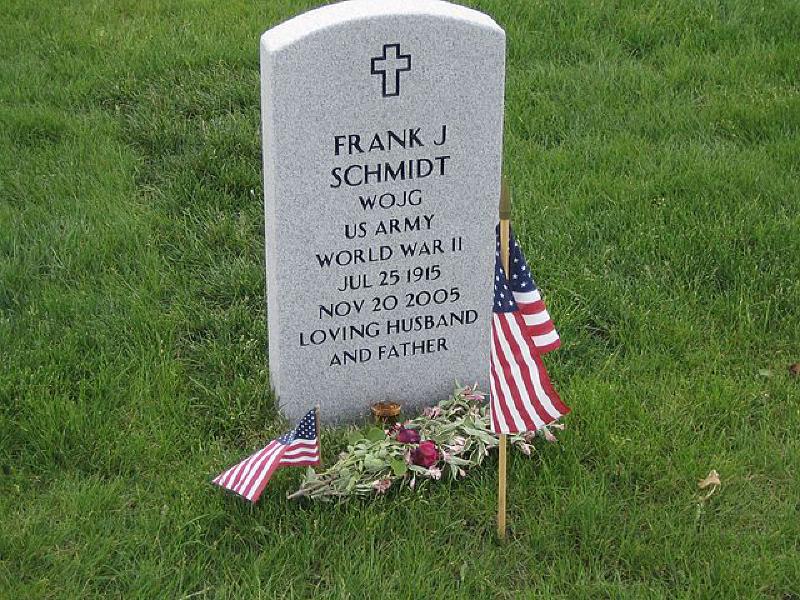A Cross?

A cross is carved into my Grandfather’s headstone, but I have a hard time understanding why.
My grandfather lived to the age of 90, and was many things in his life; he worked at the Cleveland Zoo as a teenager and tended to Balto, the sled dog of Iditarod fame; he served his country during World War II with the US Army Mine planters; he ran his own business for decades; he was a father, a grandfather, and a great grandfather. But I would not say that he was a religious man, either outwardly or inwardly.
The faith and beliefs of my grandfather are difficult to understand. Looking at it now from a perspective of his life, I would have to call him a “stealth secularist” or maybe a “hidden humanist”. This conclusion is largely drawn piecemeal from observing his actions, from listening to things that he would say, and from talking to other relatives both during and after his life.
When I was younger, and visiting my grandparents with my sisters, my grandmother would bundle us off to church on Sundays. But my grandfather would stay at home. If we asked why grandpa didn’t have to go, grandma would succinctly note that it was his choice if he wanted to go to hell. That trend continued for as long as I knew him - the only time I would see him in a church was for a wedding or a funeral.
In general, my grandfather had a somewhat jaded view towards religion. Off color religious jokes were the norm - when you called him on Easter, you invariably were told that “sorry, I’m a bit tired today - I had to roll aside a big rock to get out”. When you asked him about his school years, he would complain about how the “son of the bishop” always beat him out fo the scholarships or awards. When my grandmother would yell at him about being blasphemous, he would act in a pius manner and very sarcastically bow his head over folded hands.
My sisters and I arrived at the hospital soon after my grandfather passed away last November. Soon after we arrived, the question of a church service was raised by my Aunt Michelle. She was polling everyone to see what their thoughts were. I gave my considered opinion; namely, that he really wouldn’t care either way. No one else in the room amoungst my family or aunts and uncles seemed to have a strong opinion either way. Surprisingly, my father - who has always echoed my grandfather’s particular blend of “stealth secularism” was the one who indicated that yes, we would have a service.
So a church service it was, held in a building that my grandfather had never - at least to my knowledge - stepped into his entire life. The service was conducted by a man he had never met, who didn’t know him, but who in his homily affected a familiar air about my grandfather and spoke of him receiving his long sought heavenly reward. Connections between my grandfather as a fisherman were twisted into christian imagery as well.
I spoke at his funeral as well, reading Dylan Thomas’ Do Not Go Gentle into That Good Night at the request of my father. To me, this poem was the antithesis of everything the priest had just spoken of. To the priest, my grandfather needed to let go to join christ. I didn’t see that in him - I saw him rage and struggle against his mortality, just wanting to hold on for one more football season, one more book, one more visit from his family.
I’m not a believer, and neither are my wife or children. The rest of my family evinces varying degrees of faith, but (outside of a few aunts and uncles on my mother’s side of the family) nothing that I would consider intense. In my family and extended family, asking about religion and faith is something that is just not done. Dad would stay hom from church on Sundays, but we didn’t talk about it. We didn’t eat meat on Friday’s in Lent, but it was ok for Dad or Grandpa to do so. Although both of our families are Catholic, neither of our two youngest were baptised.
My grandfather never made his funeral wishes clear, as to if he wanted a church service or not, most likely because he didn’t care. If he had felt strongly one way or another I would have fought to see his wish through, but because he didn’t I just went along with the flow.
Do Not Go Gentle into that Good Night
Do not go gentle into that good night,
Old age should burn and rave at close of day;
Rage, rage against the dying of the light.
Though wise men at their end know dark is right,
Because their words had forked no lightning they
Do not go gentle into that good night.
Good men, the last wave by, crying how bright
Their frail deeds might have danced in a green bay,
Rage, rage against the dying of the light.
Wild men who caught and sang the sun in flight,
And learn, too late, they grieved it on its way,
Do not go gentle into that good night.
Grave men, near death, who see with blinding sight
Blind eyes could blaze like meteors and be gay,
Rage, rage against the dying of the light.
And you, my father, there on the sad height,
Curse, bless, me now with your fierce tears, I pray.
Do not go gentle into that good night.
Rage, rage against the dying of the light.
-- Dylan Thomas